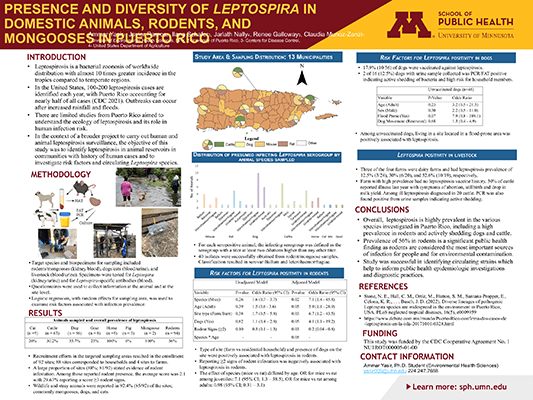Ammar Yasir
PhD, Environmental Health
Co-Authors:
Ilana Schafer, Luis Santiago Ramos, Natalia Coriano, Ralph Rivera Gutierrez, Melissa Mueller, Jarlath Nally, Renee Galloway, Claudia Munoz-Zanzi
Advisor:
Claudia Munoz-Zanzi
Keywords:
Leptospira, animal prevalence
Abstract
Leptospirosis is a common zoonotic disease by the spirochete bacterium Leptospira and is endemic in Puerto Rico, affecting people and a wide variety of animal species. Wild and domestic animals are reservoirs of pathogenic Leptospira. This work was part of larger, hospital-based surveillance project on human leptospirosis. The objective of this study was to identify the presence of Leptospira infection in domestic animals, rodents, and mongoose in various communities across Puerto Rico with history of human cases. Enrollment occurred between March and May 2021 and targeted up to 10 properties (i.e., residencies, workplaces, farms) within 10 selected sampling areas. Sampling consisted of rodent and mongoose trapping as well as collecting specimens from domestic animals present on each site. Laboratory methods included PCR, culture, and Fluorescent antibody test (FAT) for detection of Leptospira and Microscopic agglutination test (MAT) for detection of antibodies. Overall, leptospirosis prevalence, defined as positive by any test, was 62% (32/52) in mice, 50% (21/42) in rats, 30.2% (19/63) in cattle, and 35.7% (20/57) in dogs. Other species sampled included cats (1/5 =20% positive) goats (2/8 = 25% positive), and horses (5/5 = 100% positive). Based on serologic analysis, the most prevalent serogroup was Icterohaemorrhagiae and from classification of isolates was Ballum. Overall, this study provided important surveillance data on the prevalence of Leptospira spp. to help understand the ecology of leptospirosis and its role in human infection risk with the identification of various risk factors associated with the disease.

View Poster (PDF)
